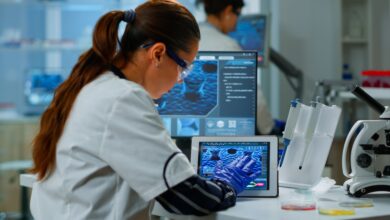
Traditional drug discovery—combining chemicals, testing in labs, and conducting animal and human clinical trials—has been slow and resource-intensive. Only a handful of molecules out of hundreds progress through the pipeline, often taking close to a decade before regulatory approval. This model, while methodical, leaves little room for speed or agility.
Data Analytics and AI: Igniting the R&D Pipeline
Pharma GCCs in India are changing the game. By embedding data analytics and AI into drug discovery, they can identify promising molecular candidates faster, reduce trial cycles, and predict outcomes more accurately.
-
AstraZeneca’s Bengaluru Innovation Hub is expanding its GCC to integrate AI-driven R&D, boosting capabilities in clinical trial analytics, digital health, and regulatory compliance.
-
Novo Nordisk’s Bengaluru centre manages global safety and efficacy data, partnering with Indian AI startups to reduce document processing times from 40 hours to just 40 minutes.
-
Sanofi Hyderabad GCC plans to grow its workforce from 1,000 to over 2,600 by 2026, primarily hiring data scientists and engineers focused on AI in clinical documentation.
-
Eli Lilly’s Capability Centre India in Bengaluru, established in 2016 and expanding to Hyderabad, is focusing on data analytics, AI, automation, and cloud-based R&D workflows.
Fast, Distributed Clinical Trials: A New Frontier
The shift to Distributed Clinical Trials (DCTs)—where participation happens remotely—relies heavily on real-time data capture, digital monitoring, and analytics. Pharma GCCs support this shift through:
-
Remote monitoring platforms
-
Automated alert systems for patient safety
-
Analytical support for decentralized trial design
Data-heavy trial management has become a core competency of GCCs, enabling quicker, more inclusive studies.
Digital Document and Data Management
Clinical trials generate massive volumes of data. Pharma GCCs specialize in:
-
Regulatory documentation and submissions
-
E-discovery and real-time metadata tagging
-
Natural Language Processing (NLP) models to summarize and structure data
-
Ensuring compliance, traceability, and audit readiness
FDA’s rising interest in AI-backed drug approval—highlighted by the Center for Drug Evaluation & Research (CDER)—underscores the need for robust, credible AI pipelines.
Accelerating Candidate Selection with Simulations
Using digital simulations, pharma GCCs can predict molecular binding, simulate disease models, and reduce the number of physical experiments by 70–80%. This lets researchers narrow their focus to the most promising candidates, speeding up the development of targeted treatments.
FDA’s Push for AI
While it has been talked about in the global pharmaceuticals and healthcare community, a recent note by the United States Food and Drug Administration (FDA) has laid down the opportunities. It clearly states that the FDA has noticed an increased use of AI throughout the drug product life cycle and across a range of therapeutic areas.
FDA has noted the increased use of AI throughout the drug product life cycle and across a range of therapeutic areas.
CDER has seen a significant increase in the number of drug application submissions using AI components over the past few years.
The artificial intelligence council of the Center for Drug Evaluation and Research (CDER) has been tasked with consolidating and continuing the work by its AI steering committee and other AI-focused working groups.
AI will continue to play a critical role in the drug development life cycle, and CDER’s role will be critical in adopting a risk-based regulatory framework that promotes innovation and protects patient safety. New opportunities are bound to emerge with the AI-led approach for the entire value chain of the industry.
Work for the targeted medicines of tomorrow for specific individuals could well have begun.
Leading Pharma GCCs in India
| Company | Location | Core Focus Areas |
|---|---|---|
| AstraZeneca | Bengaluru | AI-powered clinical analytics, digital health, R&D |
| Novo Nordisk | Bengaluru | Safety data processing, AI document automation |
| Sanofi | Hyderabad | Clinical documentation, data science, and AI |
| Eli Lilly | Bengaluru, Hyderabad | Automation, AI, analytics, and drug candidate selection |
| Pfizer, Amgen, AbbVie | Genome Valley | Genomics, biosimilars, data-driven R&D |
Pharma GCCs in India are reimagining the drug development journey by infusing data and AI into every stage—from simulation-driven discovery to AI-assisted regulatory submissions and decentralized clinical trials. With the FDA’s evolving AI framework and global enterprises anchoring R&D centers in India, GCCs are poised to become innovation hubs rather than just delivery centers.
India is emerging as a global R&D powerhouse, where GCCs are not only contributing to the science of tomorrow but are accelerating it.




